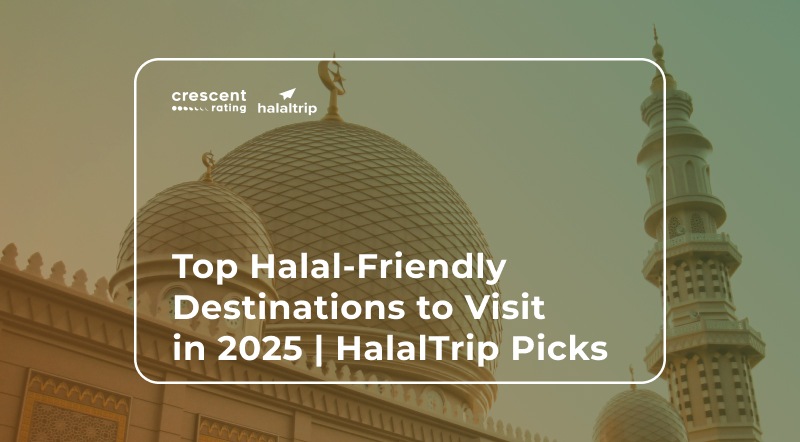
As the travel landscape evolves, 2025 is set to become a transformative year for destinations worldwide. With an increased emphasis on inclusivity and the growing demand for Halal-friendly travel experiences, the tourism industry is innovating to meet the diverse needs of modern travelers. At HalalTrip, we have curated a list of exemplary destinations for 2025 that showcase cultural richness, outstanding hospitality, and opportunities for Halal-conscious tourism.
This guide serves as both a source of inspiration for Muslim travelers and a strategic resource for stakeholders in the tourism sector, destinations, hospitality providers, and travel agencies seeking to tap into the expanding Halal travel market. The HalalTrip Top Picks for 2025 underline how these destinations are establishing new benchmarks in the industry
Valletta, Malta's capital, offers a harmonious blend of Mediterranean charm and centuries of rich history. Strategically positioned in Southern Europe, the city is a tapestry of culture, architecture, and breathtaking vistas. Its warm limestone structures, azure harbors, and welcoming atmosphere make it a magnet for cultural enthusiasts.
Malta presents a prime opportunity to develop Halal-friendly infrastructure, including prayer spaces, Halal-certified dining, and Muslim-centric cultural tours. Boutique accommodations like Iniala Harbour House highlight the potential for luxury offerings tailored to Muslim travelers. With its appeal to cultural and leisure markets, Valletta is poised to grow as a preferred destination for Halal-conscious tourists.
Known as the cultural hub of Indonesia, Yogyakarta offers travelers an authentic experience that blends history, tradition, and affordability. From the lively Malioboro Street to the serene southern beaches, Yogyakarta caters to both budget-conscious adventurers and cultural explorers.
Yogyakarta is an ideal destination for investment in Halal-certified accommodations, cultural tours, and local culinary experiences. By highlighting its affordability and cultural richness, stakeholders can position the city as a top choice for Muslim-friendly Southeast Asian travel.
Jeju Island offers a serene retreat for travelers seeking an escape from bustling city life. Known for its natural beauty, vibrant cafes, and rich local culture, Jeju combines relaxation with exploration.
Jeju’s potential lies in catering to the growing demand for Halal-certified dining and accommodations. The island’s established reputation as a tourist destination can be further enhanced by promoting Halal-friendly initiatives, ensuring inclusivity for Muslim visitors.
Kyoto stands as a bridge between Japan’s historical legacy and its modern allure. Known for its ancient temples, lush bamboo groves, and seasonal beauty, Kyoto offers an immersive experience for travelers eager to explore Japanese culture.
With its established popularity, Kyoto offers opportunities to create tailored Halal travel packages, including guided cultural tours, Halal-friendly dining, and prayer facilities at tourist sites. By embracing inclusivity, Kyoto can further enhance its appeal to Muslim travelers.
Beijing is a dynamic blend of historical landmarks and contemporary urban life. Its affordability and bicycle-friendly infrastructure make it especially attractive to budget-conscious and eco-conscious travelers.
Beijing’s appeal can be amplified by creating a robust network of Halal-certified establishments, curated cultural experiences, and affordable travel options. With a focus on inclusivity, Beijing can establish itself as a key destination for Halal tourism in East Asia.
Nestled in the mountains of northern Vietnam, Sa Pa offers a cool climate and stunning landscapes reminiscent of European destinations—at a fraction of the cost. With its terraced rice fields, quaint villages, and welcoming community, Sa Pa is perfect for nature enthusiasts.
Sa Pa’s untapped potential lies in creating a Halal-friendly infrastructure, including dining options, prayer facilities, and eco-friendly accommodations. With its natural charm and accessibility, it can become a standout destination for Muslim travelers seeking tranquility.
As the Halal travel market continues to grow, destinations like Valletta, Yogyakarta, Jeju, Kyoto, Beijing, and Sa Pa are leading the way in offering inclusive, enriching experiences. For stakeholders in the tourism industry, these destinations highlight the importance of tailoring offerings to meet the needs of Muslim travelers, including Halal-certified services, cultural sensitivity, and unique local experiences.
By embracing inclusivity and innovation, these destinations have the potential to set new standards for Halal travel in 2025 and beyond. For those looking to capture this expanding market, now is the time to invest in infrastructure, marketing, and partnerships that align with the values and preferences of Halal-conscious travelers.
Explore other top Halal-friendly destinations for 2025 here and unlock new opportunities in the thriving Halal tourism market!